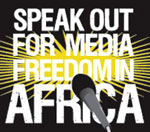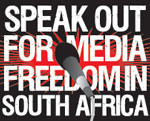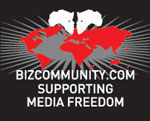"Media is going too far beyond what is fair"
"We are living in a democratic society, where criticism is allowed and journalists cannot be their own judges," Kekana said, adding that the ANC has a mandate to govern and the media has the right to publish. "We need each other, and without us I don't think there will be more stories to publish. But media is going far too beyond what is fair," he pointed out.
"Let's look at the case study of the current vice president of the ANC and the country. The news reports about his private life dragged on for about three weeks and those false stories undermined his dignity.
"We believe that media needs to be criticised the same way they criticise us. And that criticism is good as long as it does not undermine freedom of expression." Kekana said.
The relationship between the independent media, on one side, and the ANC and government, on the other side, has soured in the past four or five years, due to what media analysts call the lack of knowledge by many politicians of how the media works in a democratic dispensation.
Putting pressure on the media
The ANC, which is proposing the creation of a media appeals tribunal (MAT), a government-funded platform that will 'prosecute' outspoken journalists, has been putting pressure on the media to review its self-regulatory mechanisms, which it said were not working.
"The MAT is still up for debate and I must admit that too much was said at the National General Council but just very little was adopted in the final declaration regarding this issue," Kekana said.
"We said we will give you a chance to self-regulate yourselves. If it doesn't work, you come up with something else, and if it still doesn't work, maybe a tribunal will be the solution."
Kekana, who replaced vice president Kgalema Motlanthe who was supposed to deliver a keynote address, insisted that the ANC will not fold its arms and won't keep quiet while the media distorts the truth because that is the way of living in a democratic society.
"Parliament of the People"
"The ANC is the Parliament of the People and is like a broader church, where we have a history of internal debate, some of which turns ugly but still remains a debate. And we also have a history of being open, more open than any ruling party in Africa.
"But when journalists see this, they are quick to say, 'Ah, there are divisions in the ANC because one leader has said this, and the other leader said that.'"
Many ANC members believe journalism standards in South Africa have decreased, and they accuse the industry of lacking professionalism and investigation skills - two factors they claim lead to the publication of half-truths.
Professionalism an area to be addressed
Paula Fray, IPS Africa regional director, said professionalism is an area African journalists need to look at and address, as it creates problems such as sensationalism and 'brown envelope' journalism (bribery), among others.
Fray said African journalists ignore the importance of the role they play in society. Instead, she said, they see the media as a simple economical profession, whereby they produce stories to sell newspapers.
"Challenges start in newsrooms, and the way we tell stories narrows public space," she said.
See tweets from and about the conference through the Bizcommunity
#zamediafreedom Twitterfall or via Twitter Search (
#AfricaMedia). For the "Wits Declaration on Media Freedom and Responsibilities" and presentations, references, audio, photographs and other news articles from the conference, go to
Wits Journalism.
Last updated at 11.04 on 16 March 2011.



















































